Education
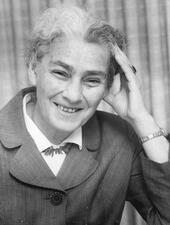
Elisabeth Goldschmidt
Elisabeth Goldschmidt was the founder of genetic studies as a research and teaching discipline at the Hebrew University of Jerusalem. She saw in the mass immigration of Jewish communities to Israel a unique opportunity for genetic research that might also contribute to the welfare of society, and in consequence founded the systematic research in human genetics and genetic counseling services in Israel.
Gertrude/Gego Goldschmidt
Gego, born Gertrude Goldschmidt, was one of Venezuela’s most creative and ingenious artists. Her sculptures have not only a sense of closure but also a boundlessness erasing any distance between viewer and artist and insisting on generating new perspectives.
Henriette Goldschmidt
At a time when women were banned from universities, Henriette Benas Goldschmidt championed women’s education as a crucial building block of a healthy society. She co-founded the General Association of German Women in 1865 and served on the association’s board until 1906, advocating women’s education for the betterment of society. In 1911 she created her crowning achievement, the Leipzig College for Women, Germany’s first women’s college.
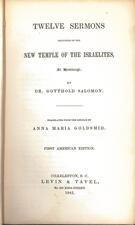
Anna Maria Goldsmid
Anna Maria Goldsmid was a Victorian Jewish advocate of women’s education and Jewish emancipation who made a name for herself as a translator, lecturer, philanthropist, and poet.
Edna Goldsmith
Edna Goldsmith was a driving force in the establishment of the Ohio Federation of Temple Sisterhoods. A founder of the federation, she served as its first president from 1918 to 1923 and then as honorary president until her death. Throughout her life, Goldsmith was active in welfare organizations, concentrating particularly in the educational field.
Luba Robin Goldsmith
In 1902, Luba Robin was the first woman to graduate from the school of medicine at the Western University of Pittsburgh (later the University of Pittsburgh). Her career combined private medical practice, teaching, writing, lecturing, and active participation in educational, social, and public health work.

Elyse Goldstein
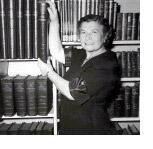
Fanny Goldstein
Librarian, social activist, and founder of National Jewish Book Week, Fanny Goldstein helped institutionalize national pride in ethnic and immigrant backgrounds through her work in libraries and settlement houses, and in her lectures and writing.
Rebecca Fischel Goldstein
The quintessential rebbetzin [rabbi’s wife], Rebecca Fischel Goldstein was a prime mover in her husband’s drive to build the Institutional Synagogue and make it a center of Jewish life in Harlem. As a consummate volunteer leader, she strove to make women a dominant force in organized Jewish life.
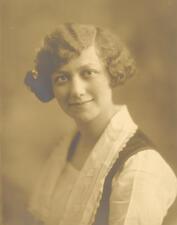
Rose (Berman) Goldstein
An early advocate of increased rights and responsibilities for women in Jewish life, Rose Goldstein was a prominent leader in the National Women’s League of the United Synagogue of America. She published a book detailing her relationship between scripture and her own self-understanding in 1972.
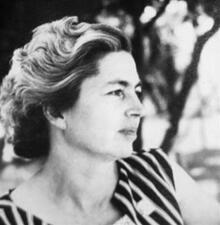
Shulamit Goldstein
A member of the underground militant group Irgun Zeva'i Le'ummi, Shulamit Goldstein became Israel’s first female pilot in the 1930s. Later in life, she also became a nursery school teacher, a poultry farmer, and a fiberglass manufacturer.
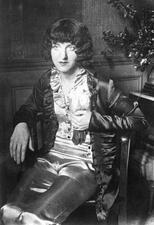
Claire Goll
Claire Goll’s poetry and prose were fueled by the tragedies and scandals that shaped her life. She and her husband, writer Yvan Goll, were central cultural figures of the French avant-garde, and her prolific body of work includes journalism, multiple novels, short fiction, and numerous translations of other authors’ works.
Rivke Savich Golomb
Rivke Savich Golomb was an educator and Yiddishist who taught at Jewish schools in Warsaw, Palestine, Canada, and Mexico over the course of her career. She and her husband established Nuevo Colegia Israelita I. L Peretz in Mexico in 1950. Their “golombist” philosophy was based around integrating Yiddishkait into a humanist Jewish world.
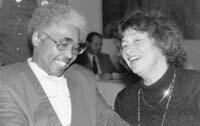
Janice Goodman
Jaimy Gordon
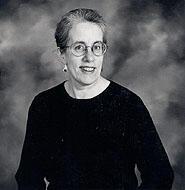
Maralee Gordon
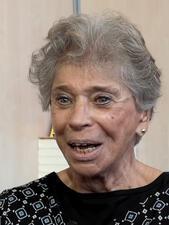
Vivian Gornick
Vivian Gornick is an American essayist, memoirist, and noted second-wave feminist. She is known for bringing a personal lens to political and critical writing.
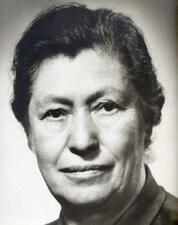
Bessie Goldstein Gotsfeld
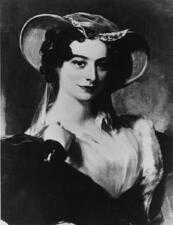
Rebecca Gratz
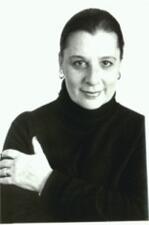
Blu Greenberg
Blu Greenberg is known as the mother of Orthodox feminism and is author of On Women and Judaism: A view from Tradition. She coined the phrase “Where there’s a rabbinic will, there’s a halakhic way,” demanding that rabbis find systemic solutions to help women who feel trapped by aspects of halakhah. Greenberg is a fierce advocate for agunot, women trapped in unwanted marriages.
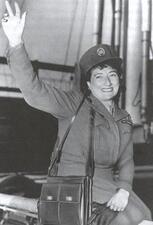
Ruth Gruber

Rose Gruening
Rose Gruening created a number of social assistance organizations to aid immigrant families, offering practical help that included childcare, funding for college educations, and even a summer camp.
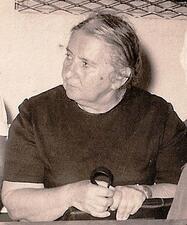
Rivka Guber
Through her work as a soldier, writer, teacher, and volunteer supporting immigrants, Rivka Guber exhibited selflessness for her neighbors and for the young State of Israel as a whole, earning her the title “Mother of the Sons” and the respect of the nation.
Angèle Guéron
Angèle Guéron was an educator in Edirne, once an important city in the late Ottoman Empire, now a border town in northwestern Turkey. The eloquent journal she kept during the Balkan Wars (1912-1913) provides a rare glimpse of life in a besieged Ottoman city and the struggles of a Sephardi Jewish woman against a conservative communal patriarchy.
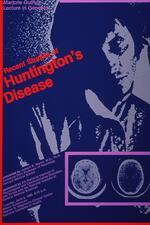
Marjorie Guthrie
First a dancer, then a teacher, Marjorie Guthrie founded the Woody Guthrie Children’s Fund and Archive in 1956 to preserve her husband’s works for future audiences. By the end of her life, she was a national activist for Huntington’s Disease and other genetic and neurological diseases.


